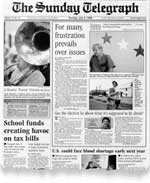Spring 2000
Covering Elections, Making it Worthwhile
By Nick Pappas
Managing Editor/News
The Telegraph of Nashua, NH
Two years ago, while preparing to kick off coverage of what promised to be a long summer of political rhetoric, The Telegraph came to a startling conclusion.
We couldn’t do it.
Press conferences and sound bites. Sound bites and press conferences. Candidate A attacks Candidate B. Candidate B attacks Candidate A. Polls and PAC money. PAC money and polls.
We just couldn’t do it. More importantly, we decided that we shouldn’t do it. There had to be a better way for a community newspaper to cover a political campaign.
– The Telegraph, June 1994

That’s how I began a front-page column six years ago on our attempt to change radically the way we covered elections two years earlier.
Looking back, there really wasn’t anything radical about it. All we decided to do was:
Today, as we evaluate our recently completed coverage of the 2000 New Hampshire presidential primary, those basic tenets haven’t changed much.
Sure, we’ve built upon them, tinkering with innovative ways of getting voters’ voices onto our news pages.
But while the methods and techniques may have changed, the overriding principles have not.
That was true four years ago, when we joined with The Associated Press of New Hampshire, New Hampshire Public Radio and New Hampshire Public Television to form “Voters’ Voice,” a Pew Center-backed partnership whose goal was to make the primary campaign serve the interests of voters.
And it was true this year when we tackled the presidential primary on our own.
So here are some of the things we did – above and beyond the more typical day-to-day news coverage of Primary 2000:
More than 75 readers responded, providing us with an important database of names, party affiliations, professions and their responses to two important requests: Name three issues you want the candidates to address. Name three things candidates do that make you lose interest in elections.
Sometimes, the meetings were off-the-record, an opportunity to have a frank debate about the candidates, issues and the media. Other times, a reporter would chronicle their thoughts for upcoming news stories. We even watched the final TV debate together over pizza and soda at one of their homes.
On three Sundays in January, for example, we explored health care, education and guns/crime with front-page stories based on interviews with voters who had told us these issues were important to them. Full-page graphics identified where the candidates stood on these issues. Related voter-survey information came from Public Agenda (www.publicagenda.org).
So we spoke to local clergy and lay leaders. We spoke to members of the minority community. We spoke to senior citizens. We spoke to first-time voters. We even spoke to people who never vote. Stories on what they had to say ran on four Mondays in January and the Sunday before the Feb. 1 primary.
Was it worth it? Yes it was, if you can believe members of our Voter Advisory Committee.
Kind of makes it all worthwhile, doesn’t it?
__________________________________
For an archive of The Telegraph’s Voters 2000 stories, www.nashuatelegraph.com.
